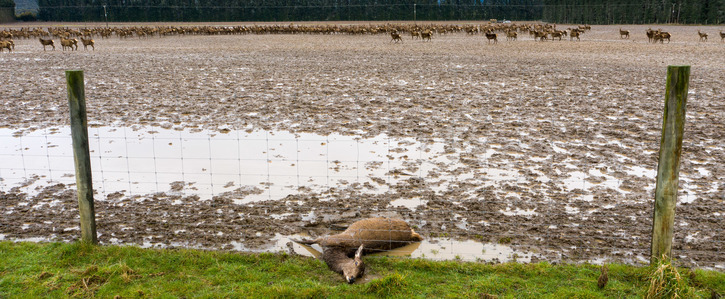1,000 signatures reached
To: Warren Parker, Chair of Pāmu (Landcorp) farms
Stop Intensive Winter Grazing: Get animals out of mud on our Pāmu farms and save our rivers

We call on New Zealand’s biggest farmer, the State-Owned Pāmu, to stop Intensive winter grazing on our publicly owned farms.
Why is this important?
Pāmu (AKA Landcorp Farms) belongs to all New Zealanders and we, the public, are all stakeholders with a right to say what is done on our behalf.
Intensive Winter Grazing (IWG) is cruel to animals, it’s polluting our rivers, streams, estuaries and groundwater, and it is damaging the reputation of Aotearoa New Zealand.
The practice of confining large numbers of animals into a small area over winter churns paddocks to a deep slurry of mud, faeces and urine. The toxic runoff pollutes our waterways and kills freshwater life in rivers and estuaries.
As well as pollution, there are serious animal welfare problems associated with the practice as this recently released graphic footage of cows being forced to give birth in the freezing mud shows.
There are better ways to farm. Pāmu should lead by example, end intensive winter grazing and shift to less intensive land use. Pāmu can do this and still make money - their own modelling proves it.
This practice is very stressful on individual Pāmu farm managers and staff. Taking the pressure off them will improve wellbeing and mental health.
More Information:
Freshwater pollution: Nitrate leaches into our aquifers at up to 10 times the rate of normal grazing, destroying groundwater for future use and remaining for hundreds of years. Phosphate and pathogen-rich effluent runs off into streams, rivers, lakes and estuaries, making them unswimmable, and killing ecosystems.
Animal suffering: When it rains the land on which these animals are grazed turns to mud, leaving heavily pregnant mothers with nowhere dry to rest and give birth. They get exhausted and end up drinking muddy water to hydrate. Dry paddocks are often full of boulders which are painful to stand on.
Soil degradation and loss: IWG destroys the soil and releases tonnes of stored carbon into the atmosphere, accelerating climate breakdown. It’s practice is heavily dependent on pesticides, herbicides and synthetic fertilisers which are causing severe decline in biodiversity and human health. It’s also the cause of huge loss of valuable topsoil.
#EndIntensiveWinterGrazing
Intensive Winter Grazing (IWG) is cruel to animals, it’s polluting our rivers, streams, estuaries and groundwater, and it is damaging the reputation of Aotearoa New Zealand.
The practice of confining large numbers of animals into a small area over winter churns paddocks to a deep slurry of mud, faeces and urine. The toxic runoff pollutes our waterways and kills freshwater life in rivers and estuaries.
As well as pollution, there are serious animal welfare problems associated with the practice as this recently released graphic footage of cows being forced to give birth in the freezing mud shows.
There are better ways to farm. Pāmu should lead by example, end intensive winter grazing and shift to less intensive land use. Pāmu can do this and still make money - their own modelling proves it.
This practice is very stressful on individual Pāmu farm managers and staff. Taking the pressure off them will improve wellbeing and mental health.
More Information:
Freshwater pollution: Nitrate leaches into our aquifers at up to 10 times the rate of normal grazing, destroying groundwater for future use and remaining for hundreds of years. Phosphate and pathogen-rich effluent runs off into streams, rivers, lakes and estuaries, making them unswimmable, and killing ecosystems.
Animal suffering: When it rains the land on which these animals are grazed turns to mud, leaving heavily pregnant mothers with nowhere dry to rest and give birth. They get exhausted and end up drinking muddy water to hydrate. Dry paddocks are often full of boulders which are painful to stand on.
Soil degradation and loss: IWG destroys the soil and releases tonnes of stored carbon into the atmosphere, accelerating climate breakdown. It’s practice is heavily dependent on pesticides, herbicides and synthetic fertilisers which are causing severe decline in biodiversity and human health. It’s also the cause of huge loss of valuable topsoil.
#EndIntensiveWinterGrazing
